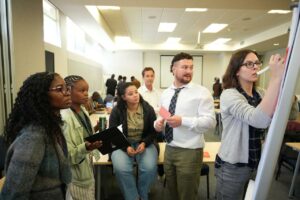With food security and agriculture dominating global agendas, the UKUDLA Summer School 2025 offered a timely platform for African and German universities, early-career scholars, and policymakers to collaborate, reflect, and advance solutions rooted in both local realities and international commitments.
UKUDLA, an isiXhosa/isiZulu word meaning “food” (or “to eat” in its active form), is a DAAD-funded African–German Centre of Excellence focusing on sustainable and resilient food systems and applied agricultural & food data science. It is hosted by the University of Pretoria, University of Mpumalanga, University of the Western Cape (through the Centre of Excellence in Food Security), LUANAR (Malawi), and the University of Hohenheim (Germany).
Learning, networking, and exchange
The Summer School, held from 14–24 September in Cape Town, combined academic training with cultural exchange and community engagement. It opened with a joint UKUDLA and Protect, Feed Care, networking event at the Protea Hotel, where participants were welcomed by Profs. Christine Wieck and Julian May. The event created space for PhDs, postdocs, and staff to connect across disciplines through interactive networking activities and shared dinner conversations.
At the University of the Western Cape, professors from partner universities were welcomed by Prof José Frantz, Deputy Vice-Chancellor for Research and Innovation, before exploring synergies in research collaboration and mentoring pathways. Meanwhile, Masters, PhD, and postdoctoral fellows engaged in workshops on sustainability science and data-driven approaches to agriculture and food systems, strengthening collaboration across institutions and borders. Dr Thandi Mgwedi, representing the National Research Foundation (NRF) — one of UKUDLA’s key funders alongside DAAD — also offered remarks, reflecting on the potential impact of these connections in advancing food security in South Africa and across the continent.
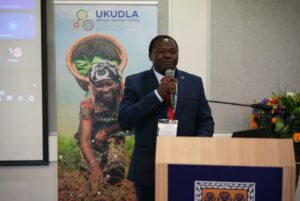
CoE-FS PI Professor Clement Nyirenda and UWC eResearch Director offers opening remarks by Sharif Mosa.
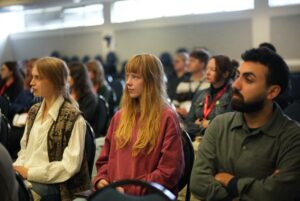
Ukudla fellows from the University of Hohenheim at the commencement of the Summer School Programme
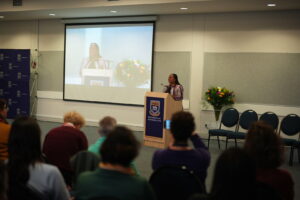
Dr Thandi Mgwebi Group Executive: Business Advancement of the National Research Foundation of South Africa offers her opening remarks.
A Public launch at the District 6 Homecoming Centre
The highlight of the programme was the official launch of UKUDLA on 16 September at the Homecoming Centre in District Six. The event opened with a performance by the Iliso Youth Choir and featured reflections from Ambassador Andreas Peschke (Germany), Dr Muriel Helbig (DAAD Vice President), Mr Maximillian Berger (Food and Agriculture Attaché, German Embassy), Prof. Julian May (Director, CoE-FS, UWC and member of South Africa’s National Planning Commission for Food Security), and Prof. Dr. Christine Wieck (University of Hohenheim).
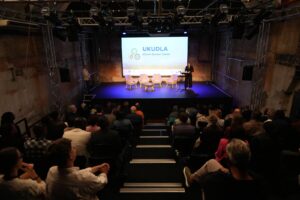
Dr Muriel Helbig, Vice President of the DAAD at the Ukudla Official Launch by Sharif Mosa
Professor May linked UKUDLA’s work to the G20 Working Group on Food Security and Nutrition, where he serves as Commissioner. He pointed to the Centre of Excellence in Food Security’s contribution to FAO Discussion Paper Three, developed with local knowledge partners at UWC and UP, and stressed the importance of achieving the progressive realisation of the right to food, underpinned by robust data and strong data science capacity.
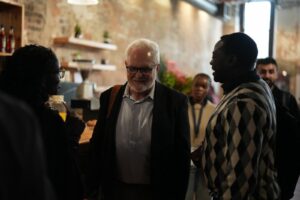
Professor Julian may at the Ukudla Official Launch by Sharif Mosa.
“Building on Ubuntu, a people-focused, development-oriented approach to complex global challenges, South Africa has focused the attention of the G20 Ministers of Agriculture on food security. The launch of UKUDLA is an important step towards achieving the ambitions expressed at the Ministerial Meeting on 19 September 2025. UKUDLA goes beyond the literal meaning of ‘food’ to encompass eating, sharing, sustaining, and relating, making it a practice of connection rather than just consumption. In this sense, UKUDLA is the expression of Ubuntu, the everyday act through which shared humanity, dignity, and community are made real.”— Prof. Julian May
Prof. Thomas Dimpfl (University of Hohenheim) added that applied economics and data science are essential to capture food system dynamics and guide evidence-based policy.That evening, Ambassador Peschke, joined by Dr Helbig, hosted a reception at the German Residence, affirming the human dimension of international academic cooperation.
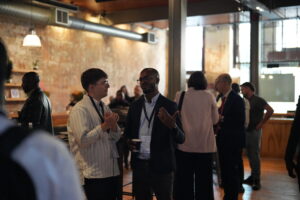
Ukudla fellows at the Official Launch by Sharif Mosa.
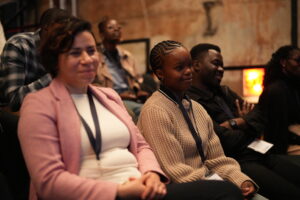
Ukudla fellows enjoying the Official Launch by Sharif Mosa
Connecting with place and community
The Summer School also emphasised experiential learning. On 17 September, students and fellows travelled to the Breede Valley for a field visit. Activities included a tour of Freedom Park, the Worcester Museum, and the Transect Exhibition, followed by a Masterchef School Competition, food storytelling over lunch, and marketplace sampling with community members. The visit highlighted how food systems are lived and remembered in local spaces.
On 21 September, participants explored themes of Food Contestations and Indigenous Food, with sessions led by Dr Amiena Bayat (UWC) and Prof. Ndiko Ludidi (UWC). The day concluded in Kalk Bay, where small groups participated in embodied workshops and walks: wild food foraging, a kraal “thinking with bodies” workshop, a walk of remembrance, and tidal pools as “containers of care.” The immersive experiences ended with coffee and koesisters in a local church hall — underscoring the connection between knowledge, heritage, and community.
Institutional Commitment to Food Security
The Summer School was attended by the Vice Chancellors of all four African partner institutions — the University of Pretoria, the University of Mpumalanga, the University of the Western Cape, and LUANAR (Malawi). Prof Robert Balfour, Vice Chancellor of UWC, joined online, underscoring the strong institutional commitment to advancing food security through joint research, training, and innovation.
The 2025 programme also carried symbolic weight as it coincided with the 100-year anniversary of DAAD, marking a century of international academic exchange and cooperation.
“Through UKUDLA, we are not only training scholars but co-creating solutions with communities. This partnership is grounded in African realities and strengthened by global solidarity.”
— Prof. Ndiko Ludidi.
By combining academic rigour with cultural connection, policy relevance, and Ubuntu-inspired practices of community, the UKUDLA Summer School reaffirmed the Centre’s mission to develop the next generation of scholars and practitioners capable of reshaping Africa’s food systems.
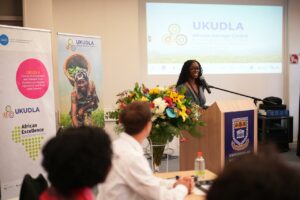
Ukudla Fellow Dr Mercy Bwanaisa from the University of Pretoria presents her research by Sharif Mosa
